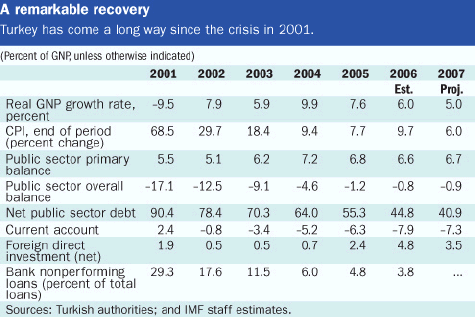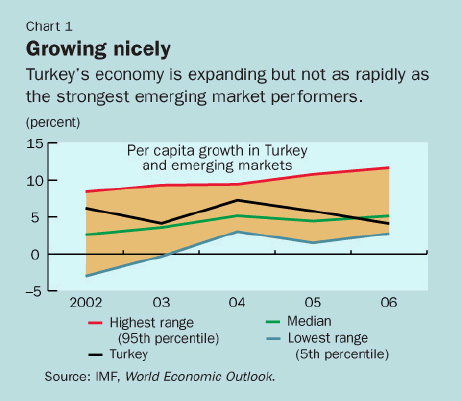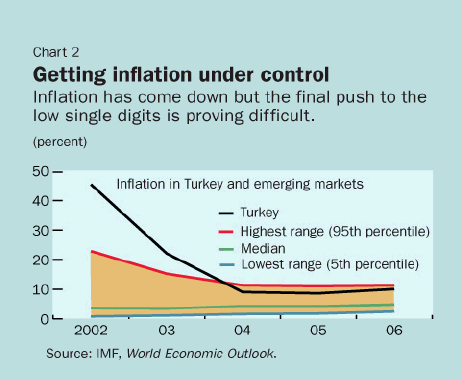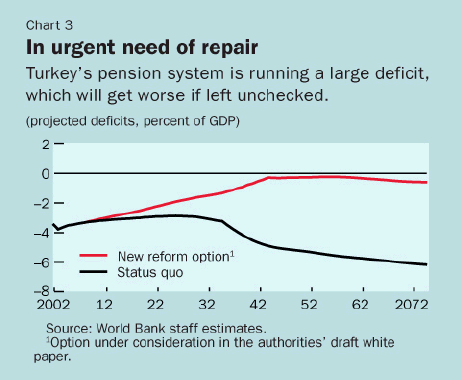
Typical street scene in Santa Ana, El Salvador. (Photo: iStock)
IMF Survey: Turkey: Taking Growth to Next Level
July 27, 2007
- Turkey's performance since the 2001 economic crisis has been impressive
- But a large current account deficit and slowing disinflation pose new challenges
- More structural reforms boost growth
Since a financial crisis rocked Turkey in 2001, the country has enjoyed a strong economic recovery.

A party supporter celebrates the results of the July 2007 national elections in Ankara: Turkey's recent economic performance has been impressive (photo: Reuters).
Remarkable Recovery
Economic growth has averaged 7½ percent and inflation has fallen from 70 percent to just below 10 percent (see table, and Charts 1 and 2).

The net public debt ratio has been cut in half, and banking system indicators have improved markedly. These results are the product of strong policies anchored to Turkey's application for European Union (EU) membership and its loan program with the IMF. Like other emerging markets, Turkey has also benefited from a strong world economy and favorable external financing conditions.

But this success has brought new challenges. With investors feeling more confident about Turkey's prospects, capital inflows have surged, resulting in a stronger real exchange rate and a widening current account deficit (8 percent of GNP in 2006). But this dependence on capital inflows exposes Turkey to sudden reversals of investor sentiment. Sustaining growth rates of 7-8 percent has also become harder now that the output gap, which opened up during the 2001 crisis, has nearly closed. At the same time, making the final push to get inflation down to the low single digits has proved difficult.

To successfully manage these challenges, Turkey should hold onto its hard-won fiscal and monetary discipline and, at the same time, revitalize structural reforms to boost growth. Rapid growth would not only raise living standards but would also strengthen the external position by improving balance sheets and the economy's ability to sustain current account deficits.
Maintaining discipline
A central element of the government's stabilization program has been fiscal discipline, anchored since 2002 to a primary surplus target of 6½ percent of GNP. In the near term, maintaining a high primary surplus would further reduce debt, lower real interest rates (which are still very high), support a further drop in inflation, and help reduce the current account deficit.
As debt falls to safer levels over the medium term, Turkey may need a new fiscal anchor. An explicit fiscal rule in the form of a limit on spending growth, for instance, would allow the government to ease the heavy tax burden on labor and financial transactions. Further improvements in fiscal transparency and public financial management would support such a rule.
The central bank's near-term priority is to bring inflation down to the official target of 4 percent (Turkey adopted inflation targeting in early 2006). Doing so will require a continued tight policy stance. Keeping the floating exchange rate in place will help contain macroeconomic risks by making it easier for the economy to adjust to emerging imbalances and by encouraging individuals to hedge against currency risks.
Boosting growth
Macroeconomic policies should be buttressed by microeconomic reforms to raise growth and ensure fiscal sustainability. The following are key priorities:
Fostering financial market development while containing risks. Turkey's relatively low levels of private credit (as a share of GNP) hold back investment and growth.
Following implementation of a new mortgage framework, an additional boost for financial intermediation would come from reducing financial transaction taxes and privatizing state-owned banks. However, rapid credit growth also creates risks for the banking system. Containing the risks calls for close supervision, adequate buffers in bank balance sheets, and improved disclosure of corporate financial statements.
Easing labor taxes and regulations. Turkey has a tightly regulated labor market and high labor taxes. Easing up on both regulation and taxes could create more jobs in the formal sector, improve productivity, and boost foreign direct investment (see Unlocking Turkey's Labor Potential).
Reforming social security. Turkey's mandatory pension systems offer the lowest retirement ages (60 for men and 58 for women) and the second-highest benefits relative to pre-retirement earnings in the Organization for Economic Cooperation and Development. As a result, the pension systems run large deficits despite high social security contribution rates (see Chart 3).

Moreover, separate systems for different types of workers hinder mobility across different sectors of the economy. Comprehensive pension reform (which would include rationalizing benefits, gradually raising retirement ages, and integrating the different pension systems) is key to securing long-run debt sustainability, creating fiscal space to ease the heavy labor tax burden, and making the labor market operate more smoothly.
Some of these reforms will likely encounter resistance. But successful implementation would yield substantial benefits in terms of economic stability and higher living standards.


